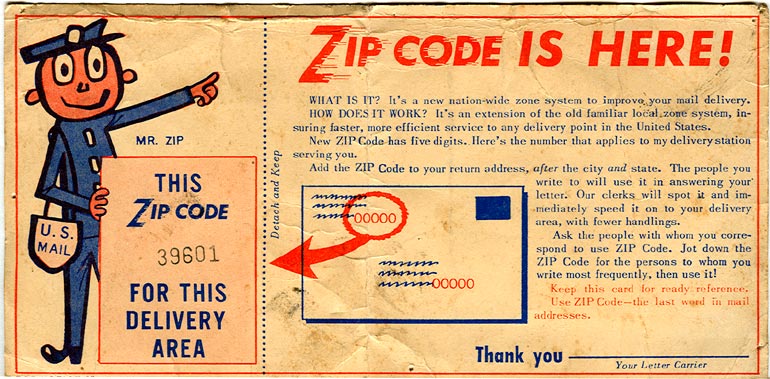
Podcast: Play in new window | Download
Subscribe: RSS
 June 25, 2014 – Segment 1
June 25, 2014 – Segment 1
Marc talks about the events of this day in history, including Virginia becoming the tenth state to ratify the US Constitution, and, four score years later, Florida, Alabama, Louisiana, Georgia, North Carolina and South Carolina being readmitted to the Union. It is also the day the Zip code was introduced to the United States fifty-one years ago, and the day the Supreme Court upheld the male-only draft as constitutional thirty-three years ago.
Today is:
Independence Day, celebrating Madagascar as they gain independence from France in 1960
Mozambique gains independence from Portugal in 1975
Slovenia and Croatia declare independence from Yugoslavia in 1990
On this day in history:
1630 – The fork is introduced to American dining by Gov. John Winthrop, a puritan lawyer and the Governor of the Massachusetts Bay Colony.
1678 – Elena Cornaro Piscopia becomes the first woman to be awarded a doctorate of philosophy. A pious woman, Elena had first wished to enter the Benedictine Order. Upon her father’s refusal she enrolled in University becoming the first woman in Italy to study theology. Piscopia studied at the University of Padua from 1672- 1678. She received both her masters and doctorate of philosophy in in 1678. The commencement ceremony was held in a cathedral to accommodate the large crowds that gathered to see her.
1792 – Thomas Peters, a “Founding Father” of Sierra Leone died on this day. Born in 1738 in Nigeria, Peters was captured by slave traders at the age of 22. He was sold off many times eventually ending up in Wilmington, North Carolina. At the beginning of the American Revolution Peters managed 0to escape and join the black pioneers (formerly enslaved blacks fighting for the British on the promise of Freedom and land). At the end of the war Peters and roughly 4,000 other black loyalists where shipped from NY state to Nova Scotia where they lived for a number of years (the majority of the black loyalist that fought with the British were sold back into slavery.) In 1791 Peters travelled to London in protest of the British Governments broken promises regarding freedom and an independent colony. The British government conceded and the new colony was settled in Sierra Leone in what is now present day Freetown. Peters arrived with about 1000 settlers in 1792. He took ill and died shortly after his arrival to Sierra Leone. Referred to as the George Washington of Sierra Leone, Thomas Peters has a street named after him in Freetown and a statue has also been erected in the city in his honor.
1788 – Virginia becomes the 10th state to ratify the US Constitution.
1798 – US passes the Alien and Sedition acts which were signed into law by President John Adams. A period marked by paranoia and suspicion, the Alien and Sedition Acts were laws that were to combat the threat to American security by foreigners, as declared by the government. The laws included new powers to deport foreigners at will and stifle any public opposition to the government. Over 20 Republican newspapers editors were arrested and some imprisoned. The Acts were staunchly Federalist and was in direct violation of the first amendment of the Constitution.
1867 – The 1st barbed wire was patented to Lucien B Smith of Ohio.
1868 – President Johnson passes law that mandates government workers to work 8 hour days.
1868 – Florida, Alabama, Louisiana, Georgia, North Carolina and South Carolina readmitted to the Union.
1876 – The Battle of Little Bighorn, Dakota Territories (Montana) begins on this day. One of the most studied US military actions in the world., the Battle of Little Bighorn has captured the imagination of many military scholars and historians spawning volumes of literature on this both tragic and triumphant day in history. Gold was discovered in the Black Hills of South Dakota in 1874 by an expedition led by General Custer. The Black Hills were at that time recognized by the United States as property of the Sioux Nation. Numerous attempts had been made by the Grant administration to purchase the hills, considered sacred land by the Sioux. The Government took military action against the Sioux in 1876 as federal troops were sent to the area. Their objective was to ultimately force the Sioux onto reservations. Every soldier in the five companies with General Custer being one of the officers at the helm. The Battle lasted two days and the outcome was a total Native American victory. The US Calvary engaged in battle against a coalition of Northern Tribe Indians including Sioux, Arapaho, Cheyenne, Lakota and Dakota. The Native forces outnumbered Custer’s column of troop three to one. In less than an hour the Natives had wiped out Custer and his men. The Battle continued into the 26th when the Native Americans had declared victory. However victorious in battle, it was the US government that would go on to win the war for the Great Plains. The Government threatened to cut off rations to the reservations. There was already a constant struggle for grass for grazing and game amongst the tribes; facing the threat of starvation, the tribes ceded the land the US.
1876 – Isaiah Dorman died on this day in 1876 at the Battle of Little Bighorn. Dorman was the only person of African descent to perish at Little Bighorn. Born a free man in Philadelphia in 1832. He settled in Fort Rice, Dakota Territory near present day Bismark. He made a living as a woodcutter in the area before he was recruited as a mail carrier. His knowledge of Sioux dialects made him an asset to the US Calvary. Isaiah Dorman traveled 360 miles round trip to deliver the mail between Fort Rice and Fort Wadsworth. He befriended the Natives and was affectionately referred to as Azinpi which translates to Teat which was as close as the Sioux language came to sounding to Isaiah as early as 1850. Custer recruited Dorman to be his interpreter for the upcoming battle at Little Bighorn. Though he was at one time close with the Native Americans in the area, even taking a Lakota wife; Dorman was not received any differently than the white soldiers. Reports told of a body beaten, burned and riddled with bullets and arrows. A small marble marker stands and shows the spot where he fell.
1894 – American Railway Union under Eugene V Debs goes on strike.
1900 – Pablo Picasso’s first exhibition of artwork goes on display on the famed rue Lafitte in Paris, France.
1905 – Warsaw and Lodz revolt against Russian Occupation
1910 – The Mann Act is passed, declaring that no women were permitted to cross state lines for immoral purposes.
1918 – Baku-Turkish Communist party forms.
1929 – President Hoover authorizes the building of the Hoover Dam.
1938 – Baltimore native William Henry “Chick” Webb and Newport News, VA native Ella Fitzgerald score a number one hit with “A Tisket, A Tasket “
1938 – Federal Minimum Wage law guarantees workers 25 cents p/hr. (rising to40 cents by 1945) a maximum of 44 hours p/week.
1940 – Adolf Hitler tours the Eiffel Tower and grave of Napoleon.
1941 – FDR issues Executive Order 8802. Also called the Fair Employment Act. The Order states “there should be no discrimination in the employment of workers in the defense industries or government because of race, creed, color or national origin.” FDR went on to reinforce the FEPC in 1943, with Executive Order 9346 requiring all government contracts to have a non-discrimination clause.
1941 – Fair Employment Practices Commission established.
1941 – German invade Dubno Poland. Hundreds of young Jewish men flee to the Russian interior at the start of German and Russian aggression. When the Germans invaded they allowed the Ukrainian residents of Dubno to do whatever they wished to the local Jewish population which numbered approximately 12,000. Chaos ensued as rampant acts of murder and robbery befell the Jews of Dubno. The Germans extracted 100,000 rubles from the local Jewish community.
1942 – Dwight D Eisenhower appointed commander of the US forces in Europe.
1943 – Crematorium 3 a Birkenau is completed.
1945 – Imperial General Headquarters in Tokyo announce the fall of Okinawa.
1947 – 1st edition of Anne Frank, Back of House, published
1948 – Truman signs Displaced Persons Bill. 250,000 Europeans arrive to the US.
1948 – Soviet Blockade of the railway, road and canal access to the sectors of Berlin under allied control. Essentially starving out the city, the Soviets wanted to gain control of the food and fuel supplies making them the most powerful force in the city. The Blockade resulted in the Berlin airlift. A coalition of air crews from the US, Britain, Canada, Australia, New Zealand and South Africa flew over 200,000 flights in one year providing up to 4700tons of supplies.
1950 – Conflict begins on the Korean Peninsula. The United States, under the auspices of the UN defends the South and engages in a brutal and frustrating war for the next three years.
1953 – 1st passenger to fly commercially around the world, 100 hours.
1963 – Zip code introduced to the United States.
1966 – Basketball legend Dikembe Mutambo was born on this day in Kinshasa, Democratic Republic of Congo. Mutambo established himself as one of the greatest shot blockers and defensive players of all time. The 8x all-star, 4x defensive player of the year retired in 2009. Renowned for his philanthropic endeavors as well as athleticism, Mutambo started the Dikembe Mutambo foundation which has been committed to improving the lives and living conditions of Children and Washington DC. For his humanitarian works he received the Presidents Service award in 1999 and went on to receive the Kennedy Citizen award in 2001 and 2009 as well.
1968- Resurrection city closed down by authorities in Washington DC.
1972 – Bernice Gena becomes the 1st female umpire in Pro Basketball.
1981 – Supreme Court upholds male only draft registration as constitutional.
1988 – Cal Ripken Jr. plays his 1,000 consecutive game.
1994 –Yassar Arafat returns to Palestine after being exiled for 27 years.
2010 – Australia gets 1st Female PM.
Born on this day in history
1947 – Jimmie Walker, Bronx NY, comedian (JJ-Good Times, At Ease)1956 – Anthony Bourdain, Chef and author1963 – Yann Martel, Canadian author and Mann Booker Prize winner, Life of Pi (2001)
This Day in Music
Birthdays in Music
Sources: The People History; This Day in Labor History; Wikipedia List of Historical Anniversaries; This Day in Women’s History; This Day in African History;History.com; History Orb; Yenoba; Selected Black Facts; Phil Konstantin’s North American Indian History; and This Day in Music




